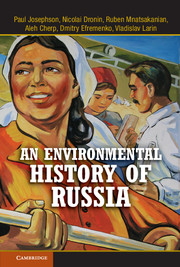Book contents
- Frontmatter
- Contents
- Introduction
- 1 From Imperial to Socialist Nature Preservation
- 2 Stalinism
- 3 The Khrushchev Reforms, Environmental Politics, and the Awakening of Environmentalism, 1953–1964
- 4 Developed Socialism, Environmental Degradation, and the Time of Economic “Stagnation,” 1964–1985
- 5 Gorbachev's Reforms, Glasnost, and Econationalism
- Conclusion After the Breakup of the Soviet Union
- Index
- References
1 - From Imperial to Socialist Nature Preservation
Environmental Protection and Resource Development in the Russian Empire, 1861–1925
Published online by Cambridge University Press: 05 April 2013
- Frontmatter
- Contents
- Introduction
- 1 From Imperial to Socialist Nature Preservation
- 2 Stalinism
- 3 The Khrushchev Reforms, Environmental Politics, and the Awakening of Environmentalism, 1953–1964
- 4 Developed Socialism, Environmental Degradation, and the Time of Economic “Stagnation,” 1964–1985
- 5 Gorbachev's Reforms, Glasnost, and Econationalism
- Conclusion After the Breakup of the Soviet Union
- Index
- References
Summary
A series of tensions played out in the environmental history of the Russian empire. These tensions had an impact on policies, practices, institutions, and human–nature interactions in the Soviet period. One was top-down pressure to modernize, by which leading officials including such tsars as Peter the Great meant to westernize, in part through adopting enlightenment attitudes toward nature and landscape. By force of will – or force of military and political occupation – Russia would create modern industry and agriculture across an ever-expanding empire. A second tension existed precisely between the power of the state and the private sector, between autocracy and public participation. In the Russian Empire, given the central role of the state, which rivaled or exceeded that in other nations, any environmental concern – alarm about the health of the forest, worries about agricultural performance and quality of soils, or concerns of nascent conservation movements – played out against concerns about the power of the government. The state could be a force of modernization and reform yet also a brake on development through its policies. Granted, the tsarist state had fewer bureaucrats per capita than the major European states and relied on devolving administration on the local population – nobles, peasant communes, and so on. Still, regarding the environment, it had a crucial role. The tsars determined to expand the empire and tame the periphery, push back the frontier, settle the steppe, and create agriculture that met the needs of growing domestic markets and export. No longer would agriculture be subsistence. This required that arable land succumb to agronomy, that polar and subpolar regions reveal their secrets, that Siberia become a part of the patrimony of the tsars and contribute to the economy, and that nomadic and indigenous people in lightly settled areas give way to settlers.
- Type
- Chapter
- Information
- An Environmental History of Russia , pp. 23 - 70Publisher: Cambridge University PressPrint publication year: 2013

